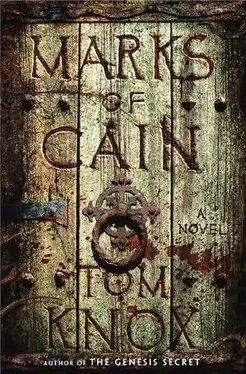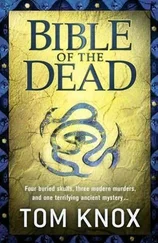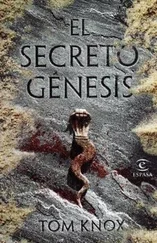Tom Knox - The Marks of Cain
Здесь есть возможность читать онлайн «Tom Knox - The Marks of Cain» — ознакомительный отрывок электронной книги совершенно бесплатно, а после прочтения отрывка купить полную версию. В некоторых случаях можно слушать аудио, скачать через торрент в формате fb2 и присутствует краткое содержание. Жанр: Триллер, на английском языке. Описание произведения, (предисловие) а так же отзывы посетителей доступны на портале библиотеки ЛибКат.
- Название:The Marks of Cain
- Автор:
- Жанр:
- Год:неизвестен
- ISBN:нет данных
- Рейтинг книги:4 / 5. Голосов: 1
-
Избранное:Добавить в избранное
- Отзывы:
-
Ваша оценка:
- 80
- 1
- 2
- 3
- 4
- 5
The Marks of Cain: краткое содержание, описание и аннотация
Предлагаем к чтению аннотацию, описание, краткое содержание или предисловие (зависит от того, что написал сам автор книги «The Marks of Cain»). Если вы не нашли необходимую информацию о книге — напишите в комментариях, мы постараемся отыскать её.
The Marks of Cain — читать онлайн ознакомительный отрывок
Ниже представлен текст книги, разбитый по страницам. Система сохранения места последней прочитанной страницы, позволяет с удобством читать онлайн бесплатно книгу «The Marks of Cain», без необходимости каждый раз заново искать на чём Вы остановились. Поставьте закладку, и сможете в любой момент перейти на страницу, на которой закончили чтение.
Интервал:
Закладка:
'And who was kept here?'
'The usual peoples. That is a memorial to them over there, the cross, and also the glass walls.' Then she pointed to his left. 'The two buildings over there are some barracks. Preserved.'
Amy was frowning.
'They kept Jews here?'
'Yes. But also…' Madame Bentayou paused. 'Lots of people. When the Nazis took over it was already a prison place for refugees from the Spanish War. So it was already full of communists and, you know, the Basques. The Gestapo added Jews and gypsies. And other minority.'
The ground looked notably swampy, rancid puddles reflecting the darkening clouds. David looked to the rear of the camp: the most distant section was divided from the rest of the prison by a low wall. A second cross had been erected upon it, another memorial.
The woman noticed his gaze, and explained.
'Another shrine. Because that is the most…the most notorious part of the camp.'
'Why?'
Madame Bentayou paused, as if to brace herself.
'It was the medical section. It is very terrible. The Germans took that part of the camp…they did the experiments here…scientific tests. Medical experiment.'
The old woman had a handkerchief balled in her hand, ready to dab at any tears. She went on, 'Blood tests. Tissue tests. And there were tortures. People killed or tortured. Many people.'
Her words dwindled, the tears were close. David realized the ghastly and obvious truth.
'Madame Bentayou.' His words were faltering. 'Were you here?'
Her voice was whisperingly quiet.
'Oui. I was here. As a very young girl. And so was my mother, she was in this camp. Like so many Cagots.' She shook her head. 'So I know what you ask next. You want to know why we never moved away after the war?' The old woman flashed him a defiant, passionate glare. 'The Cagots have been here for a thousand years, why should we let them move us!? We stay. We always stay, unless they kill us.' She was wiping away the tears with her handkerchief. Then she seemed to still her emotions: 'Monsieur Martinez…'
'David. Please.'
'Monsieur David, I want to go home now. I am sorry. As you must see this is very upsetting. I never speak of it normally.'
She rose. David felt the unasked questions like a pain. 'But please — I really want to know. About my parents.' He could hear the neediness in his own voice. He didn't care. 'What were they doing here? Where were they killed? How did you know them?'
Her face was sombre. 'Your father…came to Gurs. And I recognized him.'
'Because?'
'Your father looked like your grandfather. Non? Is this not true?'
'Yes,' he said. 'Yes, it is true. Dark hair, big shoulders. Tall…'
'I saw your grandfather in your father, the same way I recognized you. All three of you, you look the same…And this is what I told your father: I said to him, "Monsieur Eduardo, I was in the camp with your father, Sergio Martinez"…'
'My grandfather.'
'Yes.'
A new and chilly wind was raking the poplars that guarded the edge of the camp; their branches roiled, in a worried fashion, as if perturbed by the unexpected breeze.
The woman went on, 'This was a surprise for your father. He did not know your family's history, that is why he came here, to find out the truth of his background.' Her eyes were half closed. 'He did not know that your grandfather was a Basque and had been in a camp in the war. So I told him. And, David, when your father and mother learned all this, they stayed here. For two weeks. Asking more questions…your father Eduardo would come into the brasserie in Gurs, with your maman. I think my husband told him many thing, many things about the camp, and other people too.' She quietly sighed. 'I have been a widow for a decade.'
'And then? My parents were in France for a month.'
'Yes…Your father went to Provence, and maybe somewhere else, for a week or more. I do not know why. But…when he came back with your mother he was asking even more question. Difficult questions. About the camp and the Basques and the Cagots. About Eugen Fischer. About many thing. A man here, a traitor.'
'Who?'
'I cannot remember the name. I will try and remember. Later. These are terrible memories for me, for any Cagot, for anybody.'
David had to confront the final query, the necessary query. He felt he was on the disused railway track, and it had suddenly come to life, and the train was bearing down on him. Carrying the terrible truth in its rusted brown trucks.
'So where were they killed? My mum and dad?'
Madame Bentayou pointed to the main road at the edge of the camp. Beyond it was a sunflower field; the withered plants of autumn looked like tiny dead trees, made of charred and ragged paper.
'Right there. In the car. An explosion. Someone blew up the car…or at least that is what everyone in Gurs and Navvarenx believed. The police did not investigate properly. Just like they did not investigate…my son's murder, his wife's murder, weeks ago.' Madame Bentayou's voice was tremulous. 'I wonder if this is the same people killing. I wonder if I saw someone in the town, the same man, tall, both times. But I am sorry, I am talking too much, I am crazy, is that what you say? My granddaughter thinks I am losing my head. I am going now. I want some time alone. We can talk more later.'
Madame Bentayou got up wearily. She stepped close to David, and pressed his hand between her two cold small hands, gazing into his eyes. Then she turned, taking a wooded footpath back to her bungalow.
David watched her go. He also felt a need to be alone: a fierce need. He walked to the edge of the road.
Looking down at the tarmac he wondered, ludicrously, if there would still be skidmarks. Evidence of the explosion. Fifteen years later. Little quartzite nuggets of windscreen glass still sprinkled in the gutter. Patches of his mother's blood. A grass stalk smeared red.
And a car, black and gutted, with two bodies inside.
There was nothing. He stood there for ten minutes in the chilly breeze, wondering, remembering. His mother in a blue dress. Smiling and alive. He felt as if he was trying to reach out to her — here — hoping to see her ghost, here where she died. He was a small boy running along a path to the waiting arms of his smiling mother. The sadness of it was palpable, like the wind from the mountains.
The sun was gone and the air was cold.
He made his way back to the girls. Eloise was taking a phone call. Her expression was very engaged. She turned to David.
'It is my grandmother again. She remembers the name, Monsieur David. The name of the traitor. It was Jose. Jose — '
'Garovillo?'
'Yes.'
David flashed a glance at Amy: what?
But Eloise was now shouting down the phone. 'Grandmere? Grandmere!'
Amy called over: 'What! Eloise! What!'
The young Cagot girl shoved her phone in a pocket.
'She says there are men coming up the drive. She says she recognizes him — it is him — the man she saw before — '
Eloise was already running across the camp.
Running to her grandmother.
Before Miguel got to her.
They all ran. The sweat dripped in David's eyes as he sprinted after Eloise — she was fast, young, seventeen. Soon they were over the old railtrack, and sprinting past the peeling wooden doorway of the brasserie. Eloise was running to save her grandmother; David was trying to save Eloise, and maybe to save them all. As he ran, the logic of it all exploded in his mind like a speeded up film of some natural organic process: a blossoming dark rose.
It was obviously Miguel: Miguel was doing all the killing. It was always Miguel, the Wolf, slaughtering the Cagots, slaughtering everyone. A fox that kills all the chickens: for fun.
They came in sight of the bungalow beyond the woodlands, and David stared.
Читать дальшеИнтервал:
Закладка:
Похожие книги на «The Marks of Cain»
Представляем Вашему вниманию похожие книги на «The Marks of Cain» списком для выбора. Мы отобрали схожую по названию и смыслу литературу в надежде предоставить читателям больше вариантов отыскать новые, интересные, ещё непрочитанные произведения.
Обсуждение, отзывы о книге «The Marks of Cain» и просто собственные мнения читателей. Оставьте ваши комментарии, напишите, что Вы думаете о произведении, его смысле или главных героях. Укажите что конкретно понравилось, а что нет, и почему Вы так считаете.












